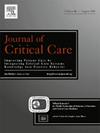音乐干预对危重病人焦虑的影响:随机对照试验的荟萃分析
IF 3.2
3区 医学
Q2 CRITICAL CARE MEDICINE
引用次数: 0
摘要
音乐疗法已被探索作为一种非药物干预的焦虑危重病人,但其有效性尚不清楚。本荟萃分析综合了涉及325名受试者的5项随机对照试验(rct)的证据。对PubMed、Embase和Cochrane数据库进行了全面的文献检索,确保纳入了2010年至2025年间发表的高质量研究。音乐治疗时间从15分钟到30分钟不等。使用有效的测量方法评估焦虑,并使用随机效应模型分析数据,以95%的置信区间(CI)计算焦虑评分的平均差异(MD)。使用I2统计量评估异质性,并进行敏感性分析以解决潜在偏倚。合并分析发现MD为- 1.11 (95% CI: - 12.97 ~ 10.75, p = 0.85;I2 = 99%),没有明显的焦虑减轻。异质性很大。敏感度分析,排除两项有影响的研究,减少了异质性(I2 = 30%),但仍未显示显著影响(MD = 0.69, 95% CI: - 2.15至3.53,p = 0.63)。漏斗图提示可能存在发表偏倚,但研究数量有限阻碍了正式评估。总的来说,目前的证据并不支持音乐疗法作为减轻危重病人焦虑的有效独立干预。有必要进一步研究标准化方案和更大的样本量,以明确其在重症监护环境中的作用。本文章由计算机程序翻译,如有差异,请以英文原文为准。
Effect of music intervention on anxiety in critically ill patients, a meta-analysis of randomized controlled trials
Music therapy has been explored as a non-pharmacological intervention for anxiety in critically ill patients, but its effectiveness remains unclear. This meta-analysis synthesized evidence from five randomized controlled trials (RCTs) involving 325 participants. A comprehensive literature search across PubMed, Embase, and Cochrane databases ensured the inclusion of high-quality studies published between 2010 and 2025. Music therapy sessions ranged from 15 to 30 min. Anxiety was assessed using validated measures, and data were analyzed with a random-effects model to calculate the mean difference (MD) in anxiety scores with 95 % confidence intervals (CI). Heterogeneity was evaluated using the I2 statistic, and sensitivity analyses were conducted to address potential bias.
The pooled analysis found an MD of −1.11 (95 % CI: −12.97 to 10.75, p = 0.85; I2 = 99 %), showing no significant anxiety reduction. Heterogeneity was substantial. A sensitivity analysis, excluding two influential studies, reduced heterogeneity (I2 = 30 %) but still showed no significant effect (MD = 0.69, 95 % CI: −2.15 to 3.53, p = 0.63). A funnel plot suggested possible publication bias, but the limited number of studies hindered formal assessment.
Overall, current evidence does not support music therapy as an effective stand-alone intervention for anxiety reduction in critically ill patients. Further research with standardized protocols and larger sample sizes is necessary to clarify its role in critical care settings.
求助全文
通过发布文献求助,成功后即可免费获取论文全文。
去求助
来源期刊

Journal of critical care
医学-危重病医学
CiteScore
8.60
自引率
2.70%
发文量
237
审稿时长
23 days
期刊介绍:
The Journal of Critical Care, the official publication of the World Federation of Societies of Intensive and Critical Care Medicine (WFSICCM), is a leading international, peer-reviewed journal providing original research, review articles, tutorials, and invited articles for physicians and allied health professionals involved in treating the critically ill. The Journal aims to improve patient care by furthering understanding of health systems research and its integration into clinical practice.
The Journal will include articles which discuss:
All aspects of health services research in critical care
System based practice in anesthesiology, perioperative and critical care medicine
The interface between anesthesiology, critical care medicine and pain
Integrating intraoperative management in preparation for postoperative critical care management and recovery
Optimizing patient management, i.e., exploring the interface between evidence-based principles or clinical insight into management and care of complex patients
The team approach in the OR and ICU
System-based research
Medical ethics
Technology in medicine
Seminars discussing current, state of the art, and sometimes controversial topics in anesthesiology, critical care medicine, and professional education
Residency Education.
 求助内容:
求助内容: 应助结果提醒方式:
应助结果提醒方式:


